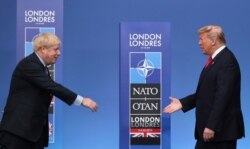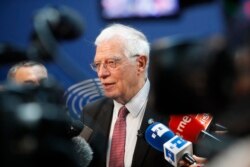European powers have triggered a formal legal dispute in reaction to Iran's decision last week to shrug off all restrictions placed on it under a landmark international agreement that intended to stop Tehran from developing nuclear weapons.
France, Germany and Britain say they made the move in hopes of preserving the 2015 deal, formally known as the Joint Comprehensive Plan of Action (JCPOA), hoping that by doing so Iran can be coaxed back into compliance.
Analysts say the move is more likely to spell the formal end of the deal, which Iran signed four years ago with six international powers, and was struck while Barack Obama was in the White House.
'Let's replace it with Trump deal'
British Prime Minister Boris Johnson indicated much the same by suggesting it would probably be better if the existing “flawed” deal were replaced with a new agreement negotiated by U.S. President Donald Trump.
Breaking with his French and German counterparts, Johnson floated the idea during a BBC radio interview of the current agreement giving way to a Trump deal, complimenting as he did so the U.S. president’s negotiation skills.
“Let’s replace it and let’s replace it with the Trump deal. That’s what we need to see,” Johnson told the BBC.
Later, British Foreign Minister Dominic Raab distanced himself from Johnson’s remarks, emphasizing that the invoking of a legal dispute by the three European signatories was aimed at bringing “Iran back into full compliance with its JCPOA obligations.”
He told the House of Commons that “the UK, France and Germany will remain committed to the deal.”
Iran's breach of 2015 nuclear deal
The 2015 agreement placed tight restrictions on Iran's civilian nuclear program, with the goal of preventing it from developing such weapons, in exchange for sanctions relief. Tehran announced it would no longer observe any nuclear restrictions after the targeted killing of Qassem Soleimani, Iran’s top general, in Baghdad in a U.S. drone attack earlier this month.
The Iranian government announced it would “set its limits based on its technical needs.”
In a joint statement Tuesday, the French, German and British foreign ministers, who have been trying to keep the deal alive, said Tehran’s announcement had left them with no choice but to take action within the deal's framework and to invoke a dispute resolution mechanism. If the dispute cannot be resolved, it could open the door to European powers joining the United States in re-imposing sanctions on Iran.
Even before Soleimani’s death, Iran had been breaching the nuclear deal, slowly lifting limits on its production of enriched uranium, which can be used to make reactor fuel but also nuclear weapons. Tehran said it was entitled to do so after President Trump withdrew the U.S. from the international agreement in May 2018 and reinstalled sanctions.
The U.S. leader has said he wants a new agreement that would place indefinite, as opposed to temporary, curbs on Iran’s nuclear program and halt Iranian development of ballistic missiles.
The European foreign ministers said their countries — referred to as the E3 — have been trying to bring Iran back into compliance and are engaged in diplomatic initiatives to de-escalate tensions in the region. But they added that, “In the meantime Iran has continued to break key restrictions set out in the JCPOA. Iran's actions are inconsistent with the provisions of the nuclear agreement and have increasingly severe and non-reversible proliferation implications. We do not accept the argument that Iran is entitled to reduce compliance with the JCPOA.”
Iran's Foreign Ministry spokesman, Abbas Mousavi, responded by saying in a statement, “The Islamic Republic of Iran, as in the past, has complete readiness to support any [act of] goodwill and constructive effort to save this important international agreement.”
Iran’s foreign minister later said that the Europeans were falling in line with the U.S., saying in a tweet they had “bowed to U.S. diktat.”
Some analysts say the Europeans are bowing to the inevitable and by invoking the dispute mechanism, they are starting to draft the JCPOA’s formal obituary.
If the parties fail to resolve the dispute in the coming weeks, the European powers would be entitled to ask the U.N. Security Council for a “snapback” or re-imposition of international sanctions against Iran. But reaching that stage in the process could take months.
“The E3 understands that they need to create greater deterrence against continued Iranian nuclear escalation and to make clear the severe consequences in the form of snapback for the regime,” said Foundation for Defense of Democracies Chief Executive Mark Dubowitz in an email to VOA Persian.
“They hope to avoid snapback and use the dispute resolution mechanism to get Iran back into compliance. I imagine they also hope to use the mechanism’s extension provisions to delay the need for snapback until they have a better idea of whether Trump will be re-elected.”
Josep Borrell, EU foreign policy chief, said he expected all parties to make “intensive efforts in good faith” now that the dispute mechanism had been triggered.
“The JCPOA is a significant achievement of sustained multilateral diplomacy following years of negotiations,” he said. “In light of the ongoing dangerous escalations in the Middle East, the preservation of the JCPOA is now more important than ever,” he added.
Robert Malley, president of the International Crisis Group, a Brussels-based research group, said he considers the European move a “mistake” that will likely have the “unintended consequence” of strengthening hardliners in Tehran. Malley, a former Obama administration official who helped negotiate the landmark nuclear with Iran, added, “The more they [the Europeans] go down that road, the more they risk losing Iran and the more they risk pushing Iran in a completely different direction.”
Iranian officials say they’re willing to return to compliance and that their increased stockpiling of enriched uranium is reversible, if Iran starts receiving the economic benefits it expected when entering into the nuclear deal, and if the U.S. lifts sanctions.
VOA Persian’s Michael Lipin contributed to this report.






